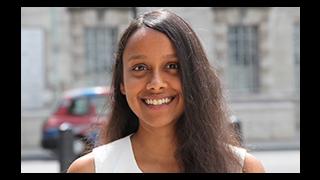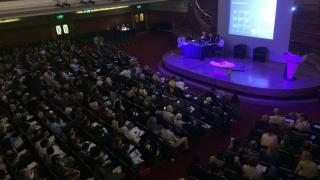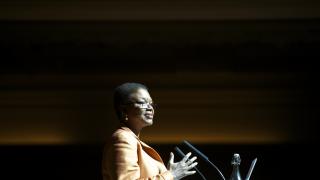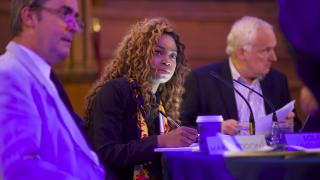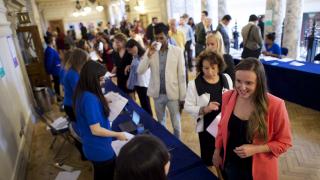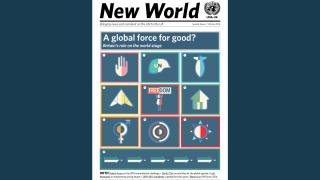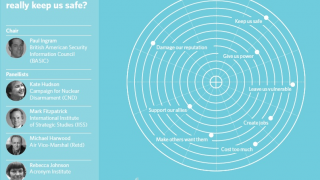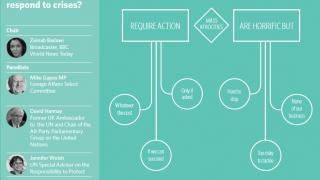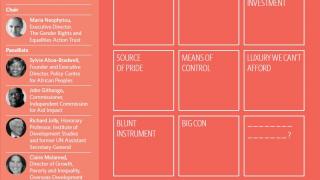
Abridged, edited transcript of the speech by the former President of Slovenia (2007 to 2012) and former UN
Assistant Secretary-General for Political Affairs (2000 to 2005). A recording of the full speech is available at
www.una.org.uk/forum
More than 200 years ago, William Pitt the Younger, then British Prime Minister, articulated an important vision. In his seminal memorandum "Deliverance and Security in Europe" he reflected on the world to be reorganised after the Napoleonic wars. He proposed an arrangement that would enable “a general and comprehensive system of public law in Europe, and provide, as far as possible, for repressing future attempts to disturb the general tranquility”.
These two elements remain fundamental: a system of public law – the legal, institutional and normative framework; and the political realism expressed in the phrase “as far as possible”. What is possible is not always what is necessary, even less so when compared with what is desirable. It is a reminder that we need to take a view of what is possible at the level of multilateral institutions.
Today, the United Nations is nearly 70 years old. It is a mature organisation, based on sound principles, that has developed a remarkable level of inclusiveness, universality and, as a result, legitimacy. It incorporates both of Pitt’s elements: political realism through the Security Council, and institutional stability, which is highly necessary but which can make changes to the system more difficult.
Looking back, we can see that the UN has had many successes: decolonisation, for example – a major transformation of the world; the evolution of peacekeeping, which has defined the UN’s work and influenced the activities of other organisations; and the creation of the international human rights system. At the end of the Second World War the whole area of human rights was undeveloped. Its evolution through the UN provided a good platform for the big changes that happened in the decades that followed.
I was involved in human rights activism in the 1970s and 80s. Just think of the world at that time, characterised by Apartheid in South Africa, military dictatorships in Latin America and communist rule in Eastern Europe. A very important factor of change has been the international system of human rights, and civil society activism based on those norms. We should never underestimate the transformative effect of what the UN has been doing.
It continues to face challenges, of course, in all of the three main areas of its work. In terms of peace and security, peacekeeping has grown in size, in diversity of operations and in the demanding nature of the task. There have been encouraging developments – the multidimensional mission in Mali, which has created a robust presence; and the intervention brigade in the Democratic Republic of the Congo, which is gaining the experience for effective military action. But there have also been problems. We must, for example, develop further the policy of zero tolerance of sexual abuse by peacekeepers.
When we see the depth of challenges to our security, from Ukraine to Syria, we must also continue to appeal to the permanent members of the Security Council to find ways forward. Time and again, we have seen that common purpose in the Council is a vital ingredient for success – this will remain the case in an expanded Council too.
Turning to development, this is an area in which the UN has always had results, in financing and delivering projects, and in developing concepts, from ‘trade not aid’ in the 1960s and 70s, to the human dimension of development in the 1980s and 90s, and the Millennium Development Goals later on. The Goals are sometimes considered to be too succinct and basic. However, they build on the words of Nitin Desai, former UN Under-Secretary-General for Economic and Social Affairs, who said the UN has to deal with “the attention deficit disorder on development issues in the media and higher reaches of government”.
Now, more than a decade later, we can see that this approach has helped. As we discuss the next set of development goals, there are three areas I would suggest we pursue. First, we have seen in the report ofthe UN’s High-Level Panel on the post-2015 development agenda, which Prime Minister David Cameron co-chaired, a target to eliminate extreme poverty within the next 15 years. If we are to go seriously in that direction it will be necessary to elaborate the profiles of poverty with more precision. We will need to define who is affected and what kind of policies need to be directed to that end.
Second, we need a broader concept of sustainability. It is often reduced to the environmental dimension but sustainability has social, legal and human rights aspects. For development to be sustainable it has to be seen as socially oriented and has to include fairness.
Third, fairness itself. Development has to be fair and fairness requires us to think clearly about bringing governance and human rights into development in a productive way. Civil and political rights have largely won that battle. We must now look at rights such as the right to education, to mental and physical health, and to an appropriate standard of living.
Lastly, we come to the area of human rights. The Universal Declaration of Human Rights, the cornerstone of the human rights system, states: everyone is entitled to a social and international order in which the rights and freedoms set forth in this Declaration can be fully realised. Can you imagine the level of ambition that guided the drafters? This is not only about formal recognition of rights, nor fighting for certain priorities. This is about building an order, domestic and international, in which rights are fulfilled. This is open-ended challenge for the UN.
I will conclude with some remarks that build on this morning’s discussion: the UN must improve its image and public outreach. Education is fundamental to this. There is a need to reform the UN Secretariat and give more resources to public information. Each substantive department should have a resourced communications strategy. The UN has many good stories to tell. Conferences like this one are very important because they help us to think about these stories and how we can use them to make the UN – this very necessary organisation – an effective institution for the future.

